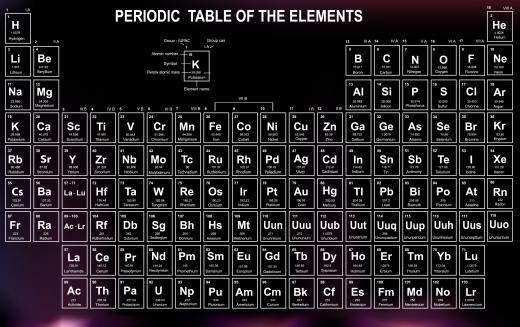What is Lithium?
 Mary McMahon
Mary McMahon
Lithium is an extremely soft, silvery-gray metallic element, identified by the symbol Li on the periodic table of elements. The metal is used in a range of industries, typically in the form of alloys and compounds, since it is extremely reactive. Consumers may also be familiar with its salts, which are used as mood altering drugs.
The reasonably abundant element was discovered in the early 1800s, although it took the work of several chemists to untangle its complexities. It has an atomic number of 3, making it the lightest solid element, and the head of the alkaline metal group. Like other metals in this group, lithium is very reactive in a pure form, and it needs to be handled carefully. The pure metal is not found in nature, since it combines readily with other elements to form compounds.

The element was originally called lithion, derived from the Greek lithos for "stone." As the name would suggest, it's often found in rocks, and the bulk of extraction uses igneous rocks as a source. It does not appear to have an important role biologically, although it may be necessary in the form of a trace element. In larger amounts, lithium can be toxic for humans, especially if it has been allowed to oxidize and form a caustic tarnish. Typically, it is stored in oil or another nonreactive material to retard corrosion.

The metal has a very high specific heat, meaning that it melts slowly and will hold high temperatures. It is often used as a heat transfer medium, and it is found in alloys, glass, and ceramics. The light weight makes it a popular choice in batteries, since it also has a high electrochemical potential, meaning that the metal can store energy. Among many other uses, the element can act as an air purifier, trapping carbon dioxide in enclosed environments like aircraft and submarines.

The pure metal is not used pharmacologically. Rather, the salts of the metal are, particularly lithium carbonate, which was approved by the US Food and Drug Administration (FDA) in 1970. Salts of the metal appear to be effective in correcting imbalances in the brain that lead to mood disorders. It acts on the neurotransmitters of the brain, and may also be used in the treatment of severe headaches. Since it is potentially dangerous in large amounts, medical professionals usually monitor blood levels throughout treatment to ensure that patients stay healthy.
AS FEATURED ON:
AS FEATURED ON:














Discussion Comments
There is a difference between lithium prescription drugs and lithium supplements, especially in dosage. One is helpful and healthful, while the prescription with its super high dosages will have negative side effects.
I am doing an assignment on mining ores, and a fairly big part is on lithium. What are its main negative environmental impacts on the world?
I'm sorry to hear that. Lithium causes kidney disease. Did your doctor tell you that before he prescribed it? Mine didn't.
It took many years (30-plus) to kill my kidneys but I've been on dialysis for the past four years.
I have a friend whose doctor recommended lithium for her. I thought it was acidic, like battery acid.
lithium is a soft silver white metallic element, the lightest of all metals and it belongs to the alkali group.
Jesse Ventura says China is putting it in our water. Alert.
For those who haven't worked it out, The Nirvana song Lithium is about someone with manic or depressive personality (possibly Kurt himself). Listen to the lyrics: "I'm so ugly", "I'm so happy". Lithium is used as a mood stabilizer for sufferers of depression and Bipolar etc.
hey thanks for that really cool information,
but, i didn't understand what lithium is and how it was made!
So now I know what it is now I just have to wonder what the song Lithium is really about by Evanesence. I'm thinking just not wanting to go back to normal but I'm not too sure.
Does lithium act on the neurotransmitter or is it rather the ions entering the membranes of the neurons it works upon?
Not claiming any expect knowledge. It just seem likely lithium carbonate might dissolve into lithium-ions in aqueous solutions, and natrium ions are responsible for driving up the membrane potential?
I love the wise geek site. it is so cool. i am a geek at my school. i feel that i can express my feelings on the site with all the other geeks in the world. meap (new nerd term)
thank you, wisegeek.
helps me understand the song lithium by nirvana! it makes so much sense.
cool.
thanks for the information. now i can use some in my story for science and type it in my own words.
I first thought about lithium as used in batteries. My camera uses lithium battries. Now I understand it had medical effects for bipolar individuals. A very light metal element found only in compounds and can be used to help people and hold electric charges for a long time. Wow - we live in a wonderful world of discoveries.
I just started Lithium for my newly diagnosed Bipolar II. Any good advice & good outcomes from people who have been treated with it?
Post your comments